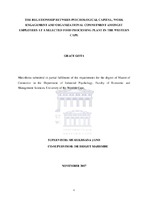| dc.description.abstract | Business operational environments are constantly challenged by shifting trends in the
economy, technology and market. The food processing industry is driven by rise in higher
income and population growth as well as growing urbanization and internationalization of
retail, which induce demand for food manufacturing products. More often than not, food
processing is marked by voluminous production and mandatory stringent food processing
standards (Henson & Cranfield, 2009). In a report by the Department of Agriculture, Forestry
and Fisheries (2012), in 2011, the food production division of the South African economy
was the most dominant in terms of output, followed by paper and beverages production.
Given the scale of impact and the volatile nature of the industry, food processing plants
require support from employees who resemble positive psychological states, work with
energy and delight as well as employees who display desire to remain with the organization.
Positive psychological capacities can be developed in employees and have been associated
with higher employee performance and satisfaction, amongst other desirable organizational
outcomes (Luthans, Avolio, Avey, & Norman, 2007). | |

